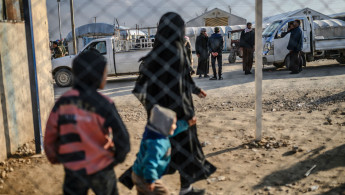Kurdish-led forces 'unable to handle' mass foreign exodus from IS' last Syria holdout
Nearly 5,000 men, women and children have left the last IS-held town in eastern Syria since Wednesday, with the Kurdish-led Syrian Democratic Forces saying they are struggling to cope with the huge numbers.
"The numbers of foreign fighters and their relatives that we are holding is increasing drastically," Kurdish foreign affairs official Abdel Karim Omar told AFP.
"Our current infrastructure can't handle the mass influx."
The situation has overwhelmed the Syrian Democratic Forces who are attempting to capture Baghouz, where hundreds of IS fighters are believed to have dug-in for a final battle.
Around 46,000 people, including a large number of foreigners, have left the last villages controlled by IS since early December.
Thousands of civilians are being held in makeshift camps, including foreign fighters with Kurdish forces urging European governments to bring their citizens home.
Many of the civilians leaving the area come from former Soviet countries, Iraq and Europe who entered IS territories when they controlled an area the size of the UK, in Syria and Iraq.
Reports suggested that 180 detained Iraqi IS fighters had been returned to Baghdad, according to Dr H.A. Hellyer on Twitter.
The SDF have said they are desperate to find a solution to the humanitarian crisis on their hands and urged countries such as the UK to take back their citizens.
|
|
"As thousands of foreigners flee [IS'] crumbling caliphate, the burden which is already too heavy for us to handle is getting even heavier," SDF spokesman Mustefa Bali said on Twitter late Saturday, using an Arabic acronym for IS.
"This will remain as the biggest challenge awaiting us unless governments take action and fulfil their responsibilities for their citizens," he said.
New reports have suggested that after IS fighters closed roads to prevent civilians escaping, they now have allowed women and children to leave the town that prompted to the exodus.
Around 40,000 refugees are being held in al-Hol camp in northern Syria, including family members of IS fighters.
"There is a lot of pressure on us, especially in al-Hol, where in addition to the relatives of IS fighters you have a large displaced population," Omar said.
Agencies contributed to this story.





 Follow the Middle East's top stories in English at The New Arab on Google News
Follow the Middle East's top stories in English at The New Arab on Google News
![The UAE is widely suspected of arming the RSF militia [Getty]](/sites/default/files/styles/image_330x185/public/2024-11/GettyImages-472529908.jpg?h=69f2b9d0&itok=Yauw3YTG)
![Netanyahu furiously denounced the ICC [Getty]](/sites/default/files/styles/image_330x185/public/2024-11/GettyImages-2169352575.jpg?h=199d8c1f&itok=-vRiruf5)
![Both Hamas and the Palestinian Authority welcomed the ICC arrest warrants [Getty]](/sites/default/files/styles/image_330x185/public/2024-11/GettyImages-2178351173.jpg?h=199d8c1f&itok=TV858iVg)